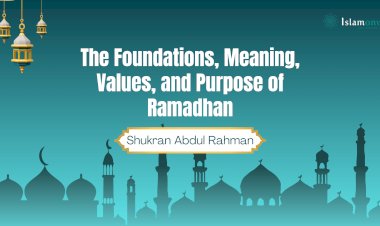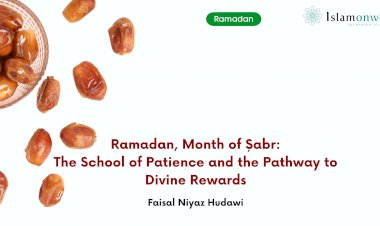Welcoming Ramadan with a Pure Heart and Sincere Repentance
One of the greatest blessings that Allah bestows upon His believing servants is granting them the opportunity to witness the blessed month of Ramadan. This is a time unlike any other, as Allah has honoured it above all other months and days. It is a month of divine mercy, where sins are forgiven, rewards are multiplied, and the gates of Jannah are flung open while the gates of Hell are shut. It is in this sacred time that Allah frees souls from the fire.
The Prophet ﷺ would eagerly announce the arrival of Ramadan to his companions, rejoicing in its immense blessings. He would say:
"A blessed month has come to you. Allah has made fasting in it obligatory upon you. The gates of Jannah are opened, and the gates of Hell are closed... In it is a night better than a thousand months; whoever is deprived of its blessings is truly deprived."
(Narrated by al-Nasa'i)
Numerous authentic narrations emphasize the virtues of Ramadan, detailing the boundless mercy and blessings it brings. As a result, the hearts of the believers long for its arrival, awaiting it with enthusiasm and hope. They welcome it with joy and prepare themselves spiritually through sincere repentance, firm resolve, and renewed dedication to worship, striving to make the most of its divine rewards.
The Serious Consequence of Neglecting Ramadan
The significance of Ramadan is so immense that the Prophet ﷺ affirmed the supplication of Jibreel عليه السلام against those who fail to take advantage of its blessings. In a hadith narrated by Jabir ibn Samurah رضي الله عنه, the Prophet ﷺ said:
"Jibreel came to me and said: 'O Muhammad! Whoever reaches one of his parents in old age and does not earn Jannah, may Allah distance him.' I said, 'Ameen.' Then he said, 'O Muhammad! Whoever reaches Ramadan and does not attain forgiveness, may Allah distance him.' I said, 'Ameen.' Then he said, 'O Muhammad! Whoever hears your name and does not send blessings upon you and dies in this state, may Allah distance him.' I said, 'Ameen.'”
(Narrated by al-Tabarani)
This hadith highlights the immense loss of one who neglects Ramadan, failing to seek Allah’s forgiveness or engage in acts of obedience and devotion. Ramadan is Allah’s exalted month:
{The month of Ramadan in which the Quran was revealed as guidance for mankind, and as clear proofs of guidance and criterion} (Al-Baqarah 2:185).
Whoever honours it through sincere faith and devotion, Allah will elevate him. But whoever fails to honour it, Allah will abase him. The greatest misfortune is for a person to live through Ramadan and yet leave it without having attained Allah’s forgiveness. The Prophet ﷺ cautioned against this loss, saying:
"May a man be humiliated who witnesses Ramadan and then it passes before he is forgiven."
(Narrated by al-Tirmidhi)
The Importance of Repentance Before Ramadan
Given the significance of Ramadan, a believer must not enter it in a state of heedlessness or sin. It is a time for spiritual renewal, a season of returning to Allah with a pure heart. True preparation for Ramadan begins with sincere repentance and a firm intention to reform. Those who persist in disobedience during this sacred month, refusing to turn back to Allah, deprive themselves of the immense opportunities for mercy and salvation.
This sacred month is marked by an abundance of divine grace and a weakening of the forces of evil. It is unlike any other time in the year, as the gates of Jannah are opened, the gates of Hell are sealed, and the devils are shackled. A caller announces each night:
"O seeker of goodness, come forward! O seeker of evil, desist! And Allah frees people from the Fire every night."
(Narrated by Ibn Majah, from Abu Hurayrah رضي الله عنه)
Yet, some enter Ramadan with heedlessness, insisting on their sins, and leave it unchanged—devoid of repentance, untransformed in their devotion, and indifferent to the opportunities of worship. Such individuals are among the truly deprived. If a person does not turn back to Allah in this sacred season of mercy, then when will they?
Allah has invited His servants to sincere repentance at all times, but in Ramadan, it becomes even more urgent. It is a month in which tears are shed, slips are forgiven, and souls are freed from Hellfire.
Hasan al-Basri رحمه الله beautifully described Ramadan as a spiritual race:
"Indeed, Allah has made the month of Ramadan a racetrack for His creation, in which they compete in obedience to Him to attain His pleasure. Some people surge ahead and win, while others fall behind and lose."
The Gate of Repentance is Always Open
One of the greatest blessings of Allah upon His servants is that He has made the door of repentance wide open, calling them to it and encouraging them to return. No matter how great one’s sins are, Allah’s mercy is greater. He promises forgiveness for all who sincerely repent, as He says:
"Say, O My servants who have transgressed against themselves! Do not despair of Allah’s mercy. Indeed, Allah forgives all sins. Indeed, He is the Most Forgiving, the Most Merciful."
(Al-Zumar 39:53)
Ibn Kathir رحمه الله explains:
"This noble verse is an invitation to all sinners—whether disbelievers or others—to repent and return to Allah. It informs that Allah will forgive all sins for those who repent, no matter how great they are or how numerous they may be, even if they were as vast as the foam of the sea. However, this promise is only for those who repent, for shirk (associating partners with Allah) is not forgiven without repentance."
Allah has made repentance a refuge for the sinner—a sanctuary where one can seek shelter from the burden of sins, confessing them with sincerity and remorse, and finding in it the transformation from the darkness of disobedience to the light of obedience. It is for this reason that Allah commands all believers to turn to Him:
"And turn to Allah in repentance, all of you, O believers, so that you may succeed."
(Al-Nur 24:31)
“So that you may succeed"—for there is no path to success except through repentance, which means turning away from everything that Allah dislikes, both outwardly and inwardly, and returning to all that He loves, outwardly and inwardly. This indicates that every believer is in need of repentance, as Allah has addressed all believers in this verse.
Thus, as Ramadan approaches, let us not delay in returning to Allah. The doors of His mercy are wide open, and He awaits those who turn to Him in sincerity. May Allah grant us the ability to enter this blessed month with purified hearts, sincere repentance, and a renewed commitment to His worship.
True repentance erases sins, no matter how great they may be. Allah’s mercy knows no bounds, and He is not burdened by the magnitude of sins when granting forgiveness. Rather, by His immense grace, He even replaces the sins of the repentant with good deeds. Allah describes this in the attributes of His righteous servants:
"And those who do not invoke another god alongside Allah, nor take a life which Allah has made sacred, except with right, nor commit adultery. And whoever does this shall face the penalty. Their punishment will be multiplied on the Day of Judgment, and they will remain in it humiliated—except for those who repent, believe, and do righteous deeds. For such, Allah will replace their sins with good deeds. And Allah is Ever-Forgiving, Most Merciful."
(Al-Furqan 25:68-70)
Al-Tabari رحمه الله narrates from Ibn Abbas رضي الله عنه:
"They were believers who had committed sins before their faith. But Allah lifted them from their former ways, guiding them to righteousness and replacing their sins with good deeds."
This means that their actions and speech, once prone to sin, transform into righteousness. Their disbelief turns into faith, their disobedience into obedience. Even the very sins they committed—if they sincerely repent and follow up with good deeds—are converted into acts of merit, as the verse explicitly states.
In a sacred hadith, Allah says:
"O My servants! You sin by night and by day, yet I forgive all sins. So seek My forgiveness, and I will forgive you." (Narrated by Muslim)
And in another hadith:
"O son of Adam, as long as you call upon Me and place your hope in Me, I will forgive you, no matter what you have done, and I do not mind. O son of Adam, if your sins were to reach the clouds of the sky and then you seek My forgiveness, I will forgive you. O son of Adam, if you were to come to Me with sins as vast as the earth, but meet Me without associating any partners with Me, I would bring you forgiveness just as vast." (Narrated by al-Tirmidhi)
Repentance for Major Sins and the Expiation of Minor Sins
While major sins (kabāʾir) require sincere repentance (tawbah nasūḥa) with all its conditions minor sins (ṣaghāʾir) are forgiven through regular istighfār (seeking Allah’s forgiveness) and the performance of good deeds.
The Prophet ﷺ said:
"The five daily prayers, from one Jumuʿah to the next, and from one Ramadan to the next, expiate the sins committed between them, so long as major sins are avoided."
(Narrated by Muslim, from Abu Hurayrah رضي الله عنه)
Similarly, Allah mentions in the Qur’an that avoiding major sins leads to the automatic expiation of minor sins:
"If you avoid the major sins which you are forbidden, We will remove from you your minor sins and admit you into a place of honour." (Al-Nisāʾ 4:31)
Additionally, performing good deeds erases past minor sins. The Prophet ﷺ advised:
"Follow up a bad deed with a good deed, it will erase it." (Narrated by al-Tirmidhi, from Abu Dharr رضي الله عنه)
This means that acts like prayer, fasting, charity, and remembrance of Allah serve as ongoing means of purification from minor sins. However, major sins demand an explicit and conscious repentance, fulfilling all the necessary conditions to ensure Allah’s forgiveness. Therefore, while good deeds and istighfār help cleanse minor faults, one must not delay repenting from major transgressions, as their burden remains until one sincerely returns to Allah.
The Conditions for True Repentance
For repentance to be accepted for major sins, it must meet specific conditions:
- Feeling Sincere Regret – True repentance involves deep regret over past wrongdoing, and this is the most crucial aspect of repentance.
- Ceasing the Sin – One cannot claim to have repented while still indulging in the sin.
- Resolving Not to Return to the Sin – There must be a firm intention to abandon the sin permanently.
- Restoring Rights and Seeking Forgiveness from Others – If the sin involved violating the rights of others, those rights must be returned, and forgiveness must be sought.
Sheikh Zayn al-Dīn al-Malībārī al-Shāfiʿī beautifully summarizes these conditions of repentance in his famous poetry, Hidāyat al-Adhkiyāʾ ilā Ṭarīq al-Awliyā (Guidance of the Intelligent to the Path of the Saints):
Seek repentance with sincere regret, forsaking the sin,
And with firm resolve, never to return again.
Free yourself from all wrongs owed to others,
And perfect these conditions with diligence and care.
Sheikh further continues:
Continuously hold yourself accountable,
For any shortcomings or negligence that may arise.
Guard your eyes, tongue, and every limb,
Striving earnestly—never be idle or complacent.
Apart from the essential conditions of repentance, it must also be performed before its time expires. For an individual, the window for repentance closes at the moment of death, when the soul is at its final departure. The Prophet ﷺ said:
"Indeed, Allah accepts the repentance of His servant unless his soul reaches the throat."
(Narrated by al-Tirmidhi and Ibn Majah)
For humanity as a whole, the ultimate deadline for repentance is before the sun rises from the west—a sign of the Last Hour. Once this event occurs, faith and repentance will no longer be accepted from those who had not already believed. Allah warns:
"On the Day when some of your Lord’s signs come, no soul will benefit from its faith if it had not believed before or had not earned goodness through its faith."
(Al-An‘am 6:158)
This verse serves as a final call for humanity to turn back to Allah before it is too late. Therefore, repentance should not be delayed, for one never knows when their individual time will come, nor when the final hour of the world will arrive. The wise are those who hasten to seek Allah’s forgiveness while the door of mercy remains open.
Ramadan: The Greatest Season of Forgiveness
Ramadan stands as one of the most blessed opportunities for repentance and deliverance from Hellfire. The Prophet ﷺ said:
"The five daily prayers, from one Friday to the next, and from one Ramadan to the next—these expiate the sins committed between them, so long as major sins are avoided."
(Narrated by Muslim, from Abu Hurayrah رضي الله عنه)
"Indeed, Allah frees people from Hell at the time of every iftar, and that is every night."
(Narrated by Ahmad, from Abu Umamah رضي الله عنه)
Moreover, the Prophet ﷺ emphasized the unmatched reward of worship in Ramadan:
"Whoever fasts during Ramadan with faith and seeking reward, his past sins will be forgiven."
(Narrated by al-Bukhari)
"Whoever stands in prayer during Ramadan with faith and seeking reward, his past sins will be forgiven."
(Narrated by al-Bukhari)
"Whoever stands in prayer on Laylat al-Qadr with faith and seeking reward, his past sins will be forgiven."
(Narrated by al-Bukhari)
These narrations highlight the immense mercy of Allah in Ramadan. It is a season where forgiveness is abundant, doors of mercy are wide open, and Allah grants countless people freedom from Hellfire every night.
Let us, therefore, welcome Ramadan with sincere repentance, determination to improve, and commitment to righteousness. May Allah allow us to be among those who emerge from this blessed month purified, forgiven, and accepted.
Disclaimer
The views expressed in this article are the author’s own and do not necessarily mirror Islamonweb’s editorial stance.
























Leave A Comment